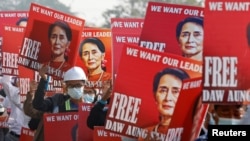The detained leader of Myanmar’s ousted democratic government is due in court Wednesday as the aftermath of the February 1 military coup continues to rock the Southeast Asian country.
Aung San Suu Kyi, 75, the leader of the National League for Democracy (NLD), is facing at least four criminal charges with the possibility of more yet to come, according to her lawyer.
Khin Maung Zaw, the lawyer representing Suu Kyi, has been denied permission to see his client and admits the current charges she faces are “not the end of the troubles for her.”
“Each of the charges can be sentenced to imprisonment of three years,” Maung Zaw told VOA.
The four charges made by the junta government, officially the State Administrative Council (SAC), include possessing unlicensed walkie-talkies, violating COVID-19 restrictions, breaching telecommunication laws and incitement to cause public unrest.
Suu Kyi already appeared in court on March 1 via video link, the first time she was seen since she was detained, but the hearing was only between her and the judge as her defense counsel hasn’t been permitted to represent Suu Kyi in court.
“We are not allowed in the courtroom. Only the judge. Nobody [else] was allowed in court,” Maung Zaw said.
He said his junior lawyers managed to sneak a peek of the detained leader as she addressed the judge via video projector, and said Suu Kyi “seemed in good condition” at the time.
“Even at this point, a fair trial, everyone has a right to meet with lawyers or relatives when in custody, but she hasn’t had that chance,” he added.
And more frustration has been added to Suu Kyi’s case, as a court hearing scheduled on March 15 was adjourned because of an internet block, prohibiting another video call proceeding.
For several weeks, authorities in Myanmar have imposed nightly internet shutdowns across the country that has largely affected mobile data networks. And in recent days there have been reports that Wi-Fi connections have been limited, too.
The military junta has said the blackouts are imposed to maintain the country’s “stability.”
Myanmar, formerly known as Burma, gained independence in 1948 from Britain, but most of its modern history has been governed under military rule.
Aung San Suu Kyi spent nearly 15 years in military detention between 1989 and 2010, winning the Nobel Peace Prize in 1991.
In 2015, Aung San Suu Kyi led her NLD party to victory, winning the country’s first open democratic election.
Often seen as a democracy icon, her international reputation dropped dramatically following reports of the Rohingya genocide from 2016-2017. She was severely criticized for failing to acknowledge the crackdown.
Maung Zaw believes a ruling on Suu Kyi’s fate may take time, depending on how “complex” the court makes her case.
“On 24th [the] four cases will be heard on that date. And at that hearing date, the evidence, the witnesses will not be heard. Simple case, complex case, very complex case like this. What type will the court take for that case? Six months, one year, or more than one year for this case?” the lawyer said.
With a lack of transparency with her initial court hearings, Maung Zaw is also concerned that she may be eventually tried behind closed doors.
“Up until now, there is no open trial, and we are demanding on her behalf to make it an open trial,” he said.
State-run media Myanmar Radio and Television (MRTV) have reported that Suu Kyi is facing an additional charge for bribery after she allegedly received payments from a businessman from 2018 to 2020, The Irrawaddy reports.
“The military government is trying to put case over case for her. She may be harassed for nearly 10 cases, [with] prison sentences together for 80 or 90 years,” Maung Zaw said.
The reported bribery charges have not been brought yet, but he said the mounting charges against Suu Kyi give her slim prospects for release.
“We have to hope. I think we are hoping against hope,” he added.
Despite a landslide victory for Aung San Suu Kyi’s NLD party in the general elections in November, the military contested election results, saying there was widespread electoral fraud, without presenting evidence.
The military coup transpired on February 1, with both Aung San Suu Kyi and President Win Myint detained.
Nationwide demonstrations have taken place, demanding for power to be returned to the democratically elected government.
But armored vehicles and live ammunition have been deployed by the military to suppress protests, with thousands detained and hundreds killed, according to the Assistance Association for Political Prisoners Burma (AAPPB). Martial law has been imposed in several townships across the country.
Pro-democracy protesters are demanding Aung San Suu Kyi be released. However, her lawyer believes the uprising isn’t now solely reliant on her situation.
“Now the people, especially the young people... all demonstrating and rising up, not only for the reinstitution of Aung San Suu Kyi,” he said. “They are resisting the military takeover and standing up for democracy. Until they get democracy, until the military dictatorship steps down, there will not be the end of demonstrations and uprisings.”
“The spark will become a prairie fire,” he added.




